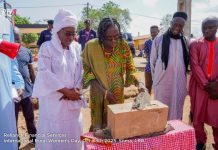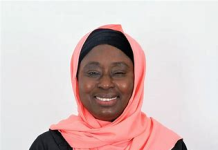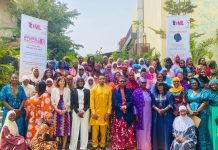By Fatoumatta K Jallow

The Women’s Bureau in collaboration with COMCEC, Cooperation for Development from the Turkish’s Government, have commenced a seven-day training for women on entrepreneurship and management of small business, for women in the Gambia, Senegal and Sierra Leone.
The Executive Director of Women’s Bureau BintaJammehSidibe, said the theme for the event, “Training on Entrepreneurship,” comes particularly at a time when the economy of the country needs the contribution of small and medium enterprises, to boost economic growth.
BintaJammehSidibe said the training brings together actors in the business of entrepreneurship development, as a means to fight against poverty in Africa, such as the governments of our sister republics of Senegal and Sierra Leone, in their bid to explore the challenges faced by today’s entrepreneurs and to identify promising approaches to addressing their needs.
She highlighted the importance of small businesses because of the positive impact they make on the economy and because it is no secret that small businesses and entrepreneurship create job opportunities. ‘‘Small businesses have played an important role in fuelling past economic recoveries. Hence, the need to think carefully about our current economic environment,’’ she said. She continued: “Small business also help our countries compete globally and often offer a level of agility in bringing innovative products to the global marketplace, that larger firms cannot match.’’ She said at the sub-regional level, many entrepreneurs provide important goods and services as they and their business help sustain the vitality of the neighbourhoods in which they live and work.
“Our nation can best provide small businesses and entrepreneurs with the support they need, to expand job opportunities.
In conclusion, she said small business owners demonstrate their commitment to their communities by serving in leadership positions, volunteering for local non-profit organizations amongst others.
Mrs. Juldeh Ceesay, Deputy Permanent Secretary at the Ministry of Finance and Economic Affairs said the significant strides made by the Standing Committee for Economic and Commercial Cooperation of the Organization of the Islamic Cooperation known as COMCEC, is a platform for addressing the economic challenges of the Islamic Ummah and contributing to the development efforts of Member States comprising the ones attending the training.
She held that the COMCEC Strategy has been implemented successfully since 2013; that the COMCEC strategy envisages a well-defined implementation mechanism which is the Working Groups (WGs), one of the instruments for the implementation of the COMCEC strategy and its annual ministerial meetings, to address policy outcomes that emanate from studies carried out in the member states in different themes.
The Deputy Permanent Secretary, Ministry of Finance added that the aim of the training is to ensure the active and direct involvement of member country’s policy makers and experts in the Cooperation areas namely, Trade, Transports, Communication, Tourism, Agriculture, Poverty Alleviation and Finance.
She said the COMCEC focal point has a crucial role in mobilizing resources for member countries/institutions and the human resources to implement the COMCEC project funding, which was held that day.
Vice President and Minister of Women’s Affairs Ajaratou Fatoumatta Jallow-Tambajang, said investing in women’s economic empowerment contributes in harnessing the demographic dividend as they penetrate existing and emerging markets.
This according to Madam Tambajang, is because of the strong belief that women entrepreneurs can drive economic growth provided that the enabling environment is created, coupled with factors such as access to finance, ownership and control over productive resources such as landed property, access to capacity building programmes and being in the same footing with their male counterparts in terms of employment and employability and effectively involved in governance issues for them to operate and thrive.
Madam Jallow Tambajang added that women’s economic empowerment and access and control of productive resources, access to finance, eventually results to improved livelihoods, reduction in Income inequality, improved nutrition and food security, which ultimately results to poverty eradication.
Vice President Tambajang said agenda 2063 for Sustainable development has well-articulated the need for women’s empowerment as a universal call for action by all stakeholders including businesses and civil society organizations among others, to come together and reap the benefits of economic growth and development. She said Africa’s quest for economic transformation is well reflected in Agenda 2063, which aims to translate Africa’s robust growth into economic and social transformation.
“Goal 8.3 of the 2030 for Sustainable Development Agenda States that Promote Development-oriented policies that support productive activities, decent job creation, entrepreneurship, creativity and innovation and encourage the formalization and the growth of micro, small and medium size enterprises, through access to financial services.
The Minister for Women Affairs said like many sub-Saharan African countries, the informal economy in the Gambia provides work, income and livelihood for the vast majority of the population in particular, poor women. The Gambia’s informal economy mainly consist of market and street vendors. She added that the growth of this sector, however, has not received much attention, given that women and girls lack the opportunities at the level of decision-making, access to productive resource, institutional support, and social services resulting to its potential to combat poverty, yet to be fully appreciated. As a result, the causes and plights of market women, who are often the unheard, continue to face challenges.
Madam JallowTambajang highlight the need to fight against poverty which requires greater effort to address the needs and contribution of women in the informal sector, that conducts businesses in Africa.


















